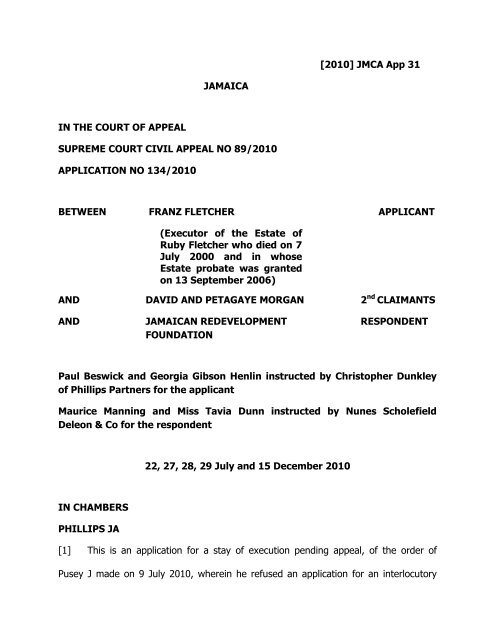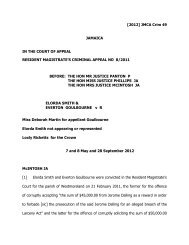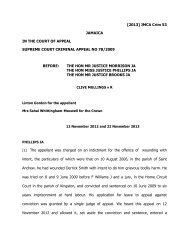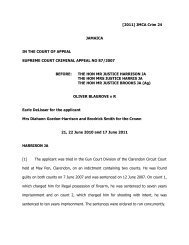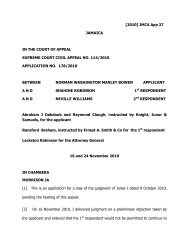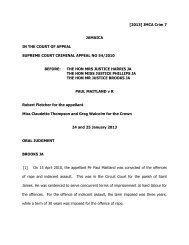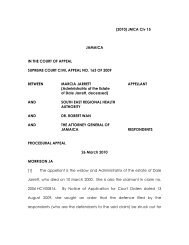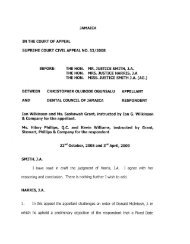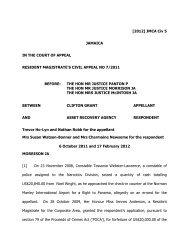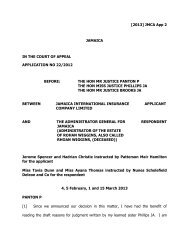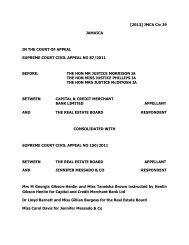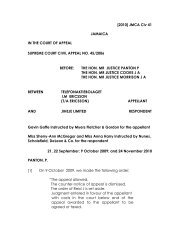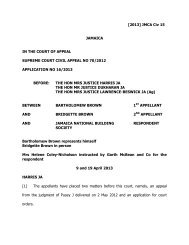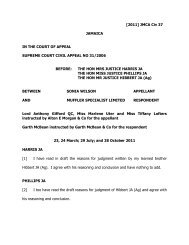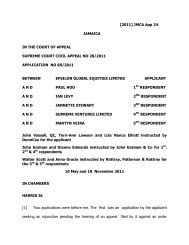Fletcher _Franz_ V Jamaican Redevelopment Foundation.pdf
Fletcher _Franz_ V Jamaican Redevelopment Foundation.pdf
Fletcher _Franz_ V Jamaican Redevelopment Foundation.pdf
- No tags were found...
You also want an ePaper? Increase the reach of your titles
YUMPU automatically turns print PDFs into web optimized ePapers that Google loves.
[2010] JMCA App 31JAMAICAIN THE COURT OF APPEALSUPREME COURT CIVIL APPEAL NO 89/2010APPLICATION NO 134/2010BETWEEN FRANZ FLETCHER APPLICANT(Executor of the Estate ofRuby <strong>Fletcher</strong> who died on 7July 2000 and in whoseEstate probate was grantedon 13 September 2006)AND DAVID AND PETAGAYE MORGAN 2 nd CLAIMANTSAND JAMAICAN REDEVELOPMENT RESPONDENTFOUNDATIONPaul Beswick and Georgia Gibson Henlin instructed by Christopher Dunkleyof Phillips Partners for the applicantMaurice Manning and Miss Tavia Dunn instructed by Nunes ScholefieldDeleon & Co for the respondent22, 27, 28, 29 July and 15 December 2010IN CHAMBERSPHILLIPS JA[1] This is an application for a stay of execution pending appeal, of the order ofPusey J made on 9 July 2010, wherein he refused an application for an interlocutory
injunction. The grounds of the application were inter alia, that an application forinjunction had been made on 4 June 2010 before Morrison J, who ordered that thestatus quo should remain until 21 June 2010; that the order was continued by Pusey Juntil 9 July 2010 when he refused the application for injunction but ordered that thestatus quo should remain to give the claimants an opportunity to appeal; that if the staywas not granted it would be to the applicant’s detriment in that it would render theappeal nugatory; and that the appeal had a strong likelihood of success. There was anaffidavit of urgency filed in support of the application but it did not contain any otherinformation than what was set out in the grounds of the application, which was clearlyinadequate. When the matter came before me on 22 July 2010 several orders weremade for the parties to provide the court with the material on which they intended torely, and the record of appeal and the core bundle comprising 187 and 204 pagesrespectively were filed the day before the hearing of the application commenced. Costsof the adjournment were granted to the respondent as the application had begun on ashaky footing.Background Facts[2] The fixed date claim form was dated and filed 1 June 2010, and in it theclaimants sought an order that they (<strong>Franz</strong> <strong>Fletcher</strong>, as duly appointed executor of theestate of Ruby <strong>Fletcher</strong>, having been granted probate, and Peta-Gaye and DavidMorgan, purchasers and/or assignees of the equity of redemption) were entitled toredeem mortgages Nos. 470252, 497057 and 911389 registered on the certificate oftitle in respect of 27B Banana Walk, Orange Grove, Kingston 8 in the parish of Saint
Andrew, registered at volume 1060 folio 480 of the Register Book of Titles (BananaWalk). The claimants sought release of the certificate of title for Banana Walk onpayment of the purchase price, in order to register the 2 nd claimants’ interest in the saidproperty, and an injunction to restrain the sale of Banana Walk by the defendant otherthan to the 2 nd claimants.[3] An affidavit of <strong>Franz</strong> <strong>Fletcher</strong> was filed with and in support of the fixed date claimform. Mr <strong>Fletcher</strong> deposed to the grant of probate to him on 13 September 2006subsequent to the death of Ruby <strong>Fletcher</strong> on 7 July 2000. On 11 September 2006, heentered into an agreement for sale of Banana Walk to the 2 ndclaimants for the sum of$15,000,000.00 which sum he said had been based on a current valuation report. Themortgages mentioned above were all registered on the certificate of title for BananaWalk, originally executed in support of a guarantee to Century National Bank Limited(Nos. 470252 and 497057) and as principal debtor to Century National Building Society(No. 911389). The transfer of the mortgages to the respondent was registered on 4June 2004. Each mortgage contained a clause whereby the mortgagor covenanted notto sell or part with possession of the mortgaged premises without the express writtenconsent of the mortgagee. The payments on the mortgages fell into arrears and Mr<strong>Fletcher</strong> said that it was in those circumstances that he entered into the agreement ofsale with a view to redeeming the mortgages and paying down any indebtednesslawfully found to be due.[4] Mr <strong>Fletcher</strong> further deposed that he had been reliably informed by his attorneysat law that in normal conveyancing practice the mortgagee’s consent is not asked for,
ut the mortgagee is informed of the sale and through arrangements and undertakingsthe transaction is concluded. However in this sale the mortgagee was insisting that theirformal consent was required and that having not been obtained he was in breach of theterms of the mortgage. He did not think that the position taken by the mortgageecould have prevented him from concluding the sale as he had been advised that itoperated as a bar on his ability to redeem the mortgages. He contended that themortgagee has however, unreasonably persisted with its stance. In the interim the 2 ndclaimants have since repaired the property which the mortgagee would have beenaware of. Notwithstanding all of that, the mortgagee, he said, sought to sell theproperty, firstly by public auction, and then by private treaty, for the sum of US$350,000.00, which would have included the enhanced value of the property.[5] Mr. <strong>Fletcher</strong> made it clear that it was only the mortgagee’s stance whichprevented the completion of the sale to the 2 nd claimants. He exhibited certain items ofcorrespondence between the attorneys representing the claimants and the mortgagee’sin-house attorney, indicating the purchasers’ financial ability to close the sale, therequest for the relevant documents including the certificate of title and discharge ofmortgage from the respondent, and the respondent’s clear communication that theterms for the release of the title had not been met. The notice to complete and makingtime of the essence was duly served on him.He could not do so, owing, he said, tothe recalcitrance of the respondent. He said that he had even assigned the equity ofredemption to the 2 nd claimants, by authorizing them to pay the closing costs to therespondent and releasing their attorneys from their undertaking to pay those costs to
him, and by sending the documents registrable on transfer to the 2 nd claimants, viz, theduly signed and cross stamped transfer, the estate duty certificate, and the applicationfor registration on transmission.[6] It was Mr <strong>Fletcher</strong>’s position that the injunction ought to be granted as theclaimants had a superior right to redeem the mortgage that damages were an adequateremedy for the respondent, and the claimants could meet an undertaking for thosedamages from the estate.[7] The 2 nd claimants filed an affidavit in the proceedings. They confirmed what Mr<strong>Fletcher</strong> had deposed to in his affidavit and stated that they were only at the time ofthe making of the affidavit being made aware of the clause in each of the mortgagesstating the mortgagor’s covenant not to sell or part with possession of Banana Walkwithout the written consent of the mortgagee, and the fact that due to the lack ofconsent or the failure to request the consent the mortgagee was refusing to permit thetransfer and imposing conditions that the applicant could not meet. The 2 nd claimantsstated that they had entered into the sale in good faith, made all the necessarypayments and arrangements to complete the same, had not known that the consent ofthe mortgagee had to be obtained prior to the sale and that failure to do so couldjeopardize the sale completely, in spite of the funds to complete the transaction beingavailable, and their mortgagee through their attorneys having given undertakings toclose. They confirmed having been put into possession of Banana Walk and that theyhad made significant improvements to the same. They had, as they were desirous ofcompleting the transaction, served notice to complete the sale on the applicant, without
success. They had agreed to pay the proceeds of sale directly to the respondent toredeem the mortgage to the full extent of the value of the property at the time of thesale. They considered it inequitable and unjust for the respondent to sell Banana Walkto anyone else. They therefore lodged caveat no. 1630543 to protect their interests,maintaining that they had a right to redeem the mortgage to the extent of the value ofthe property, and prayed the court’s aid by way of an injunction to restrain therespondent from selling the property by public auction or private treaty to anyone else.[8] The claimants then amended the fixed date claim form to include an alternativeclaim for relief. They now also sought:“A declaration that mortgages 470252, 497057 and 911389are invalid and/or void and/or unenforceable against theClaimants.”Mr <strong>Fletcher</strong> deposed to a further affidavit in support of this alternative claim. Heindicated that the mortgages had been granted on 23 June 1987, 7 June 1989, and 27November 1995 respectively. He also stated that at the time the transfer of themortgages was effected, the loans were in default and were part of the bad debtportfolio of the bank taken over by the Financial Institutions Services Limited. He saidthat the original debtor, Kingston Armature & Dynamo Works Limited (the company),had received formal notices of demand from the respondent for the amounts ofJ$139,254,535.00 and US$73,299.00 in May 2009 and he referred to the fact that hehad been sent one also in the same amounts on the basis that he had guaranteed theloan. The company had received registered statutory notices in respect of themortgages and one had been directed to Ruby <strong>Fletcher</strong> relative to Banana Walk. It was
pointed out that the restructured debt agreement between the company and therespondent had not been signed by Mr <strong>Fletcher</strong> in his capacity as executor of Ruby<strong>Fletcher</strong>, who had died by then, and further that any restructuring or departure fromthe terms of the original debt would discharge the estate of any liability as guarantor ofthe same. If the agreement was an acknowledgment of the debt, that would be analteration which would also discharge the guarantor. Mr <strong>Fletcher</strong> also stated that hehad been reliably informed by his attorneys that any indication that reliance was beingplaced on the acknowledgment of the debt in 2003, was an admission that theobligation to repay was statute barredby virtue of section 7 of the Statute ofLimitations. He relied further on the Statute for the proposition that the obligationunder the mortgage was discharged once the debt was statute barred, since no monieshave been paid on the mortgages in excess of 12 years prior to the notices of default orstatutory notices under the Registration of Titles Act.[9] The respondent filed an affidavit by Tavia Dunn, in response, who stated thatthere was another suit, claim no. HCV 06728 of 2009, in which the company sued therespondent and made an application for injunctive relief with regard to certainproperties of which Banana Walk was one, but in that application Banana Walk hadbeen withdrawn from the consideration of the court. Documents filed in that suit wereexhibited to her affidavit, namely the claim form, particulars of claim, affidavits of <strong>Franz</strong><strong>Fletcher</strong> in his capacity of director of the company, and Janet Farrow, chief executiveofficer of the <strong>Jamaican</strong> branch of the respondent. The application for injunction wasrefused in the Supreme Court. An application for an injunction pending appeal was
heard by a single judge of appeal who refused injunctive relief. That decision wasreviewed by the Full Court which has not yet given its decision.[10] Miss Merline Pattterson, the loan recovery manager of the <strong>Jamaican</strong> branch ofthe respondent deposed in her affidavit that the covenant in the mortgages restrainingthe mortgagor from dealing with the properties without the consent of the mortgageeswas a provision expressly included to guard against the situation which currentlyobtained, as by registration of the mortgage third parties would also have notice of thecovenant. The question of formal or informal consent, she said, therefore did not arise.She further deposed that the Banana Walk property was part of a suite of securitiesgiven by Ruby <strong>Fletcher</strong> to cover the indebtedness of the company, and the redemptionof the mortgage required the settlement of the entire indebtedness or such compromiseas agreed. She said that Mr <strong>Franz</strong> <strong>Fletcher</strong> had negotiated a conditional agreement andreferred to correspondence which was supposed to have captured the same, (but thatletter seemed to indicate that those negotiations were conducted on behalf of thecompany). She denied that the respondent had refused any attempts made to redeemthe mortgage, but instead said that the respondent had postponed enforcing itsmortgage while it gave the company and those acting on behalf of the mortgagors anopportunity to settle the indebtedness. As no payments were made, and noarrangements concluded with undertakings or otherwise to satisfy the defendant, theproperties, including Banana Walk, were put up for auction, but there were no bids.[11] Miss Patterson said that there was no basis for the 2 nd claimants to claim thatthey were bona fide purchasers as they were bound by the respondent’s registered
mortgage which had been breached. Further the respondent had not received anycommunication from any financial institution until January 2009. They did not knowabout any documents in the 2 nd claimants’ possession to close the transaction and didnot accept that there had been any proper assignment of the equity of redemption.Finally, she stated that any caveat filed could not override the respondent’s registeredlegal mortgage and pointed out to the court that the claimants had not shown that theycould satisfy any undertaking as to damages.[12] The 2 nd claimants’ affidavit in reply challenged the position taken by therespondent generally, but insisted that the Banana Walk property could be releasedonce the full purchase price was paid over to the mortgagee. Further, they indicatedthat the caveat protected the equity of redemption, and that could not be overridden bythe legal mortgage. Finally, the 2 nd claimants referred to the improved value of theBanana Walk property as a result of their efforts, and stated that it was theirmatrimonial home.[13] Mr Huntley Watson, an attorney of 23 years standing, in his affidavit spoke aboutthe conveyancing practice when acting for the vendor/mortgagor, requesting of themortgagee the amount to settle and to close the mortgage account, and the exchangeof undertakings to ensure completion. He said that he was familiar with the standardclause requiring the consent of the mortgagee. He also said that in the ordinarypractice, and for practical reasons, a mortgagor who is desirous of dealing with hisencumbered property would notify his mortgagee of his intention to sell the same. Thisis to avoid a penalty for prepayment and so a three month notice is usually given to
edeem the mortgage. In his view, “it is not a request with an expectation that themortgagee will say no. In fact consent is usually granted as a matter of course”.[14] Miss Janet Farrow merely exhibited to her brief affidavit the instruments ofguarantee executed by Ruby <strong>Fletcher</strong> on 23 June 1987 and 7 June 1989.Shespecifically referred to and relied on clause 9 of the guarantee which she said protectedthe respondent. She deposed that Mr <strong>Fletcher</strong> was the person who negotiated therestructured debt agreement, and so “as the party who negotiated the agreement andas the personal representative of the estate Ruby <strong>Fletcher</strong>, Mr <strong>Franz</strong> <strong>Fletcher</strong> knew andconsented at all material times to the terms of that conditional agreement”.Theagreement was not however executed by the applicant in his capacity as executor ofthe estate, as the applicant was only appointed as executor by a grant of probate 3years after the date of the agreement, as mentioned, (nor as her personalrepresentative she having been deceased at the time). Miss Farrow also indicated thatthe respondent relied on section 33 of the Limitation of Actions Act as it provided “thatany payment of principal or interest or a written acknowledgment of the debt given bythe debtor to the creditor or his agent keeps the debt alive.” Further she had beenadvised by her attorneys that “there is no statutory defence of limitation to theenforcement of the guarantee or the mortgage”.[15] With that factual background the Honourable judge refused the interlocutoryinjunction but as indicated maintained the status quo, giving the claimants anopportunity to file an appeal which they did, and so the status quo has continued.
[16] In his reasons for judgment the learned trial judge set out the background tothe claim and on the basis of the principles enunciated in American Cyanamid vEthicon [1975] 1 All ER 504 and National Commercial Bank Jamaica Ltd v OlintCorp Ltd Privy Council Appeal No 61 of 2008, delivered April 28, 2009 identified thefactors to be considered on the grant/ refusal of an interlocutory injunction. Thesewere:“(i) Whether there is a serious question to be tried.(ii) Where the balance of convenience lies.(iii) Whether damages is an adequate remedy.”He dealt with each factor separately. He identified what the claimants said were seriousissues to be tried. These were:“(i) Whether the [defendant is] statute barred from seeking toenforce the mortgages in question.(ii) Whether the Estate of Ruby <strong>Fletcher</strong> was a party to therestructured agreement in relation to the mortgages above andwhether her guarantee is therefore discharged.(iii) Whether the 2 nd Claimants Peta-Gaye and David Morgan as thepurchasers and/or assignees of the equity of redemption, areentitled to redeem mortgages Nos. 470252, 497057 and911389 over the property in question.”[17] In his judgment the learned trial judge sets out sections 7, 30 and 33 of theLimitation of Actions Act. At page 5 of his judgment he stated thus:“ Section 7 of the Limitations of Action Act provides:
‘It shall and may be lawful for any person entitled toor claiming under any mortgage of land to make anentry, or bring an action or suit to recover such land,at any time within twelve years next after the lastpayment of any part of the principal money orinterest secured by such mortgage, although morethan twelve years may have elapsed since the time atwhich the right to make such entry or bring suchaction or suit shall have first accrued.’Section 30 of the same Act goes on to say:‘At the determination of the period limited by this Partto any person for making an entry, or bringing anyaction or suit, the right and title of such person to theland or rent, for the recovery whereof such entry,action or suit respectively might have been made orbrought within such period, shall be extinguished.’And according to Section 33:‘No action or suit or other proceedings shall bebrought to recover any sum of money secured by themortgage, judgment or lien, or otherwise chargedupon or payable, out of any land or rent, at law or inequity, or any legacy, but within twelve years nextafter a present right to receive the same shall haveaccrued to some person capable of giving adischarge for or release of the same, unless in themeantime some part of the principal money, or someinterest thereon, shall have been paid, or someacknowledgement of the right thereto shall havebeen given in writing signed by the person by whomthe same shall be payable, or his agent, to theperson entitled thereto, or his agent; and in suchcase no such action or suit or proceeding shall bebrought but within twelve years after such paymentor acknowledgement, or the last of such payments oracknowledgements if more than one, was given’.”
[18] He then arrived at the following conclusion which is set out in paragraph 21 ofhis reasons for judgment which was the subject of detailed submissions from bothcounsel before me and this specific finding is now the subject of a counter notice ofappeal. I will therefore set out the paragraph in its entirety.“21. Since there is no evidence to contradict the fact thatall the mortgages would have been statute barred by 2009as alleged by the claimant and by which time 12 years wouldhave passed, the question will turn on the Claimants’contention that the Agreement to Restructure Debt datedthe 21 st May 2003 was not made by or on behalf of the 1 stclaimant either in relation to the guarantees or themortgage. The importance of this argument is that thisAgreement could amount to an acknowledgment of the debtwhich would operate to defeat the Limitation point.”[19] The learned trial judge went on to find that pursuant to clause 9 of theguarantees executed by Ruby <strong>Fletcher</strong>, and on the basis of the principles derived fromthe authorities of Holme v Brunskill [1878] 3 QBD 495 and Perry v NationalProvincial Bank of England [1910] 1 Ch 464, “the guarantee preserves theDefendant’s rights and in all the circumstances the 1 st Claimant remains bound”. Heindicated that: “the applicable principles from the cases are that a guarantor is excusedfrom further performance where there has been some material alteration to the originalterms of the debt, unless (a) his consent is obtained or (b) the alteration isinsubstantial, or (c) is beneficial to him”. The judge concluded that: “The Agreement toRestructure the Debt dated the 21 stMay 2003 was actively negotiated by the 1 stClaimant and he cannot therefore now argue that the Estate of the original guarantor
who he stands for in his capacity as personal representative is not thereby bound”. Hetherefore found that the mortgage in question was not statute barred and/or invalidand/or void and/or unenforceable and that the Estate was bound by the Agreement.[20] With regard to the question of the 2 nd claimants’ redeeming the mortgages, herelied on the judgment of McDonald Bishop J in Lorgay Construction & EquipmentCo Ltd & Another v <strong>Jamaican</strong> <strong>Redevelopment</strong> <strong>Foundation</strong> Inc. claim no 2009HCV 4293 delivered 2 September 2009, indicating that third party rights which hadarisen subsequent to the transfer of the mortgages, which had been endorsed on thecertificate of title for the mortgaged property, in circumstances where no fraud hadbeen alleged to affect the indefeasibility of title of the mortgagee, then the subsequentequitable and unregistered interests of purchasers would be subordinate to the legalrights of the registered mortgagee. He therefore dismissed this claim stating that thepoint raised no serious issue to be tried.[21] Having found that there was no serious issue to be tried the learned trial judgesaid that it was unnecessary to deal with the adequacy of damages however hecommented on the fact that the 2 nd claimants had averred that they had made theproperty their matrimonial home but indicated that they had done so with knowledgeof the respondent’s interest. He said that as the permission of the respondent wassought to allow the transfer that ought to have put the 2 nd claimants on notice that itcould have been refused. Any improvement to the property effected by them wouldhave been done with the knowledge of the respondent’s interest and their reluctance toapprove the sale, and in any event could be accommodated by damages.In the
judge’s view the acquisition of the property was recent, and there was no indicationthat they were not able to obtain another property.The Application in the Court of AppealThe applicant’s submissions[22] The applicant submitted that in order to obtain a stay of execution of the orderof Pusey J, or in effect to obtain an injunction pending appeal, the onus was on them toshow either some prospect of success or a good arguable case on appeal.[23] Counsel argued that the respondent by its notice of demand sent in May 2009described the company’s loan portfolio as non performing, and that the company as theprinciple debtor was in default, so the respondent called on the guarantor for payment.Counsel submitted however that at the time this demand was issued the respondent’sright to recover under the mortgages was prima facie extinguished from 1999, 2001and 2008 respectively, as they were statute barred. There was no evidence of anyacknowledgment of the debt by the applicant and that would have had to have beendone during the statutory lifetime of the loan as “one cannot revive that which isalready dead”.Additionally it was submitted that there was no evidence that theagreement to restructure the debt was signed by the applicant either in relation to theguarantees or the mortgage. Mr <strong>Fletcher</strong> signed as stated on the document as directorof the company, and in his own right as a guarantor. In counsel’s written submissionsit was stated that the respondent was now attempting to say that it did not need theconsent of the applicant, but it was argued that it had obviously been the intention ofthe respondent to have the applicant agree to be bound through the execution of the
agreement, and that not having occurred, the question that would arise is can therespondent now proceed to recover the debt which would otherwise have beenextinguished?[24] It was also the claimants contention that they were entitled to redeem themortgages and they had been endeavouring to do so since 2006, without success.Banana Walk was only one of the properties held as security for the company’s debt,and the property had a finite value and the net proceeds of sale had been offered tothe respondent. It was submitted that the only way the applicant would reduce itsindebtedness to the respondent is for the property to be sold, and so the postureadopted by the respondent in those circumstances had been unconscionable, and toexpect to retain the property in order to obtain the enhanced value through theimprovements effected by third parties would simply be unjust. This, it was furthersubmitted, is possibly a circumstance in which the court would consider making anorder for sale under Part 66 of the Civil Procedure Rules 2002 (CPR). In any event, itwould be a serious question to be tried. Counsel pointed out also that the agreementfor sale was entered into long before the demand for payment was sent to theapplicant.[25] Finally, counsel argued that the defendant’s reliance on the term in the mortgagethat the property ought not to be dealt with without the mortgagees express consentwas to be read in the light of normal conveyancing practice, which had been put beforethe court, and within the context of the fact that the mortgagor as the registeredlegal owner has the power to deal with the property and “ to transfer the legal estate,
not merely in equity as under the general law”.It was submitted that in thecircumstances of this case the actions of the mortgagee were operating as a fetter onthe equity of redemption and the insistence on the “ right to consent” may not be eitherjustified and/or appropriate.[26] Having submitted that there are serious questions to be tried, counsel arguedthat damages would not be an adequate remedy. Relying on both AmericanCyanamid and NCB v Olint she stated that the court in aiming to do justice shouldendeavour to take the course which results in the least prejudice to the parties. In thiscase injunctive relief would therefore be warranted as the 2 nd claimants would lose theirmatrimonial home with all its improvements, and on the other hand the respondent hadnot averred that it would suffer any prejudice at all, and damages could satisfy anyadditional loss. Counsel also submitted that as there was a bona fide challenge to thevalidity of the mortgages in the context of the Limitations of Actions Act then in thosecircumstances relying on the principle enunciated in the case of Brady v Jamaica<strong>Redevelopment</strong> <strong>Foundation</strong> & Ors (SCCA No 29/2007, delivered 12 June 2008), thecourt ought to prevent the mortgagee from exercising its powers of sale.The respondent’s submissions[27] The respondent submitted that the applicant had raised two legal issues in theapplication, namely the defence of limitation of actions, and that the guarantee of Ruby<strong>Fletcher</strong> had been discharged by reason of her estate not being a party to therestructured debt agreement. The contention of the applicant he said was not
supported by the facts, and in respect of the 2 nd claimants they had no claim againstthe respondent and so must look to the applicant for any alleged relief due to them.[28] Counsel submitted that the applicant had applied for a stay of execution, butthere was nothing to stay. However, in the event that the application was intended tobe an application for an injunction pending appeal, then the test on such an applicationis whether the applicant has a good arguable appeal. He relied on the following cases;-Michael Levy v <strong>Jamaican</strong> <strong>Redevelopment</strong> <strong>Foundation</strong> Inc and AnotherSCCANo 26/2008 Application No 47/2008 delivered on 11 July 2008; Polini v Gray (1879)12 Ch. D. 438; Erin Ford Properties v Cheshire CC [1914] 2 All ER; KetchumInternational plc v Group Public Relations Holdings Ltd [1996] 4 All ER 374.[29] The respondent argued that the claimants had no prospect of success. Themonies were owed, and the substantive claim was brought under Part 66 of the CPR,with the mortgagor’s claim being one for sums on the sale of Banana Walk, which is amoney claim and not one for injunctive relief. He submitted that the court should nottherefore be concerned about the clog on the equity of redemption as both partieswanted the property sold. It was all about money. He submitted that the evidencedisclosed that the mortgagor had defaulted (paragraph 7 of his affidavit), and inindicating that he, <strong>Franz</strong> <strong>Fletcher</strong>, as executor of the estate of Ruby <strong>Fletcher</strong>, hadentered into the agreement with the 2 nd claimants to pay off any sums that may belawfully found to be due, he was acknowledging the debt to the respondent.Additionally, the claim that the mortgages were statute barred arose very late in the
day, and although the amendment was made in time, it was after the recognition bythe applicant of the debt.[30] The more important issue, however, it was submitted, was that there was noevidence before the learned trial judge as to the last payment on the loans whichwould be essential in order to raise the defence that the mortgages were statutebarred. There must be a basis on which one is submitting that the mortgages areunenforceable. The dates submitted before Pusey J were the dates when the loanswere made, which it was submitted was untenable, as no lending institution would havegiven successive loans if no payments had been made on the loan previously given.Further, it was submitted, that there was evidence in the computer generated exhibit toMiss Farrow’s affidavit which showed to the contrary. So the wrong dates had beenused as the starting point. Counsel also argued that time only starts to run against thesurety, from the date of the demand (May 2009), and he relied on an excerpt from theHalsbury’s Laws of England Volume 28 para 670 and respectfully submitted thatparagraph 21 of the judgment of Pusey, J could not stand, and that these argumentsformed the basis of a counter notice of appeal which had since been filed.[31] With regard to the issue of the execution of the restructured debt agreement, itwas the respondent’s contention, that as Mr <strong>Fletcher</strong> negotiated and signed the sameas a director on behalf of the company and on his own behalf, it does him no credit tosay that he did not do so as executor of Ruby <strong>Fletcher</strong> when he had that capacity.Further, and in any event, he knew about the agreement and its terms and participatedin concluding the same, and therefore the guarantor could not be relieved of her
liability. He relied on the case of High Mountain Feed Distributors Limited v PawPleasers Limited 2004 MBQB 220, to support this submission. Finally, he submittedthat, pursuant to clause 18 of the guarantee, the guarantee survived the death of theguarantor, and clause 9 of the guarantee covered all debts, whether restructured orotherwise, as the terms embraced any renewals, extensions, releases, discharges andcompromises from the customer. The respondent therefore did not require the 1 stclaimant’s consent to the agreement. The respondent was endeavouring to exercise aright against the guarantor, the mortgagor and the principal debtor and once the debtstill subsisted the respondent could proceed against all parties. Counsel argued that inany event the provisions in the Statute of Limitations do not provide a defence to theexercise of the powers of sale of a mortgagee under a legal registered mortgage. In allthe circumstances it was argued therefore that there was no serious question to betried and no good arguable appeal.[32] With regard to the 2 nd claimants, it was submitted that they could not be in anybetter position than the applicant, and they were not bona fide purchasers, as theywere bound by the terms of the mortgage and they ought to have known that consentwas required and that it had not been obtained. The agreement was entered into inSeptember 2006, and there was no communication from the purchasers’ mortgagee tothe respondent until December 2009. This should have put the 2 nd claimants on noticethat the transaction may not be completed, and indeed the respondent had indicated anintention to the applicant not to do so from as far back as 2006, on the basis that theirconsent had not been obtained.Additionally, the lapse in time from the date of
06.03.2009 „Службен гласник “ број 3 страна 24Врз основа на член 50 став 1 точка 3 од Законот за локална самоуправа(„Сл.весник на РМ“ бр.5/02) и член 95 од Статутот на општина Охрид („Сл.гласник наопштина Охрид“ бр.8/07), Градоначалникот на општина Охрид го донесе следниот:З А К Л У Ч О КЗА ПРОГЛАСУВАЊЕ НА ОДЛУКАТА ЗА УСВОЈУВАЊЕ НА ИЗВЕШТАЈОТ ЗАОСТВАРЕНИТЕ РЕЗУЛТАТИ ОД РАБОТЕЊЕТО НА ЈП„ОХРИДСКИ КОМУНАЛЕЦ“-ОХРИДПО ГОДИШНАТА СМЕТКА ЗА 2008 ГОД.СЕ ПРОГЛАСУВА, Одлуката за усвојување на Извештајот за остваренитерезултати од работењето на ЈП„Охридски Комуналец“-Охрид по Годишната сметка за2008 год., што ја донесе Советот на општина Охрид на седницата одржана на ден05.03.2009 година.Број 08-578/3ОПШТИНА ОХРИД05.03.2009 год. Градоначалник,О х р и дАлександар Петрески с.р.Врз основа на член 36 став 1 точка 9 од Законот за локална самоуправа(„Сл.весник на РМ“ бр. 05/02) и член 18 став 1 точка 9 од Статутот на општина Охрид(„Сл.гласник на општина Охрид“ бр.8/07), Советот на општина Охрид на седницатаодржана на ден 05.03.2009 година донесе:О Д Л У К АЗА УСВОЈУВАЊЕ НА ИЗВЕШТАЈОТ ЗА ОСТВАРЕНИТЕ РЕЗУЛТАТИ ОД РАБОТЕЊЕТОНА ЈП „ОХРИДСКИ КОМУНАЛЕЦ“ - ОХРИД ПОГОДИШНАТА СМЕТКА ЗА 2008 ГОДИНАЧлен 1Се усвојува Извештајот за остварените резултати од работењето на ЈП„Охридски комуналец“ - Охрид по Годишната сметка за 2008 година.Член 2Оваа одлука влегува во сила осмиот ден од денот на објавувањето во “Службенгласник на општина Охрид“.Број 07-578/СОВЕТ НА ОПШТИНА ОХРИД05.03.2009 год. Претседател,О х р и дВладо Чингоски с.р.e-mail: sovet@ohrid.gov.mk
indefeasibiity of title, and the defence of the registered legal interest was not applicableas the claimants were asserting a claim based on it. It was important to note, saidcounsel that the applicant had obtained probate, and entered into the agreement forthe sale of Banana Walk in 2006, some time after the restructured agreement wassubmitted which was in 2003, and so the applicant did not have the capacity, and wasnot acting as executor, at that material time.Analysis[35] I accept the submissions of counsel for the respondent that in respect of theorder of Pusey J, there is nothing to stay the execution thereof, and I have treated theapplication as one for an interim injunction pending appeal as this was the approachadopted by counsel for both parties.It is clear that when an appellant is pursuingsuch an application, for an interim injunction pending appeal, under rule 2.11 (1) (c) ofthe Court of Appeal Rules 2002 the test pursuant to the dicta of Morrison JA in MichaelLevy v Jamaica <strong>Redevelopment</strong> <strong>Foundation</strong> Inc and Harrison JA in NCB v Olintis whether the appellant has reasonable grounds of appeal, or has serious issues to becanvassed on appeal or has a good arguable appeal. In examining whether theappellant has crossed the threshold the question is, whether in exercising his discretionto refuse injunctive relief the learned trial judge was plainly wrong.[36] There appear to be 4 main issues which may be pursued on appeal. These are:-(i) At the time when the notices of demand were issued in May 2009were the loans and mortgages statute barred and/orirrecoverable?
computer generated statement attached to the affidavit of Miss Farrow dated 13January 2010 exhibited to the affidavit of Tavia Dunn filed in the court below, butattaching documents filed in claim no. HCV 06728/2009, in which the company is theclaimant, and is in respect of payments allegedly made by that claimant subsequent tothe date of the agreement to restructure the debt. As a consequence, counsel for theapplicant used the date of the mortgages as a reference point to determine when timeshould run in favour of the mortgagor, which may not be applicable, but which wasarguable on the evidence.Counsel for the respondent complained that for theapplicant to rely on the Statute, specific evidence with regard to payments made onprincipal and interest, and when the loans fell into default and became vulnerable foraction, should have been placed before the court by the applicant. That not havingbeen done, the learned trial judge, having regard to the years 1991, 2001 and 2008being the years submitted when the respective mortgages would have beenextinguished, made the finding that”… Since there is no evidence to contradict the factthat all the mortgages would have been statute barred by 2009 as alleged by theclaimant and by which time 12 years would have passed…”, which at this stage of thematter may well be a reasonable conclusion. Counsel for the respondent has submittedthat in respect of the guarantees, as the liability arose after demand for payment hadbeen made in writing time runs only from such demand, which on the evidence wasfrom May 2009. This submission was based on clause 4 of the instruments ofguarantee, and is supported by authority (see Re Brown’s Estate, Brown v Brown[1893] 2 KB 833, CA). However clause 3 of the guarantee states that the guarantees
are continuing, and continue to secure outstanding balances and sums remainingunpaid to the Bank (now the respondent). The question must arise whether theguarantee subsists if the sums are no longer recoverable under the mortgage, therights to do so having been extinguished. Is the debt extinguished? What is the trueimpact of that on the guarantees, if the cause of action arises separately, and in anyevent would that only affect an action against the guarantor for the recovery of thesums due, or can it affect the exercise of the powers of sale of the mortgagee andfinally do the provisions of the statute affect that exercise?. It does appear that thereare serious questions to be tried.Issue (ii) - Execution of Agreement to Restructure Debt[39] The learned trial judge found that the debt was acknowledged by the agreementto restructure debt and that clause 9 of the Instrument of guarantee covered thatcompromise and the applicant remained bound by the same.What is clear is that on the signature page of the said agreement there is no signatureof <strong>Franz</strong> <strong>Fletcher</strong> executing the same on behalf of the estate of Ruby <strong>Fletcher</strong>. Hesigned on behalf of the company, and on his own behalf as a guarantor. An issue mustarise as to whether he can be presumed to have also been acting on behalf of theestate in 2003, the date of the agreement, being one of the executors of the estate, ashe had not yet obtained probate and did not do so until September 2006. If he did notexecute the agreement in that capacity, and one could therefore argue that he, onbehalf of the estate, cannot be said to have acknowledged the debt, then the defence
of limitation of action as set out above as outlined in the Statute could be applicable. Itwould be a serious question to be tried.Issue (iii) - the preamble and Clause 9 of the Instrument of Guarantee[40] Clause 18 of the instrument of guarantee makes it clear that the guarantee is notdischarged by death. As a consequence the estate continued to be liable pursuant tothe guarantee, and <strong>Franz</strong> <strong>Fletcher</strong> would have been one of the representatives of theestate subsequent to the death of Ruby <strong>Fletcher</strong> on 7 July 2000 and then the soleexecutor appointed on the grant of probate in September 2006.The preamble to the instrument of guarantee states as follows:“IN CONSIDERATION OF CENTURY NATIONAL BANKLIMITED ( herein called the ‘Bank’) agreeing at the requestof the undersigned and each of them if more than one todeal with or to continue to deal with or to continue to dealwith KINGSTON ARMATURE & DYNAMO WORKS LIMITED(hereinafter called ‘the Customer’) in the way of its businessas a bank the undersigned and each of them, if more thanone, hereby jointly and severally guarantee(s) payment tothe Bank of all debts and liabilities, present or future, director indirect, absolute or contingent, matured or not, at anytime owing by the Customer to the Bank or remainingunpaid to the Bank whether arising from dealings betweenthe Bank and the Customer or from other dealings orproceedings by which the Bank may be or become in anymanner whatever a creditor of the Customer, and whereverincurred, or whether incurred by the Customer alone or withanother or others and whether as principal or surety,including all interest, commissions legal and other costs,charges and expenses (such debts and liabilities beingherein called the ‘guaranteed liabilities’), the liability of theundersigned hereunder being limited to the sum ofUNLIMITED Dollars with interest from the date of demandfor payment at the rate or rates mentioned in paragraph 5hereof.”
Clause 9 of the instrument of guarantee reads as follows:“Without prejudice to or in any way limiting or lessening theGuarantor’s liability and without obtaining the consent of orgiving notice to the Guarantor, the Bank may discontinue,reduce, increase or otherwise vary the credit of theCustomer, may grant time, renewals, extensions,indulgences, releases and discharges to and acceptcompositions from or otherwise deal with the Customer andothers, including the Guarantor and any other guarantor asthe Bank may see fit, and the Bank may take, abstain fromtaking or perfecting vary, exchange, renew, discharge, giveup, realize on or otherwise deal with securities andguarantees in such manner as the Bank may see fit, and theBank may apply all moneys received from the Customer orothers or from securities or guarantees upon such parts ofthe guaranteed liabilities as the Bank may see fit and changeany such application in whole or in part from time to time.”The learnedtrial judge found that based on any true interpretation of the aboveprovisions, clause 9 would have embraced the compromise effected by the agreement,and he said that since <strong>Franz</strong> <strong>Fletcher</strong> had knowledge of its terms and had been involvedin the negotiations leading up to its conclusion, the estate was bound by theagreement. But as indicated above the issue would arise as to whether the agreementwas signed by him as representative of the estate, and also whether the knowledge ofits terms were or could be imputed to the estate. If this finding by the learned trialjudge is not correct, then there may not have been any acknowledgment of the debt,(which in any event could have been after the entitlement to recover the debt had beenextinguished). The defence of limitations of actions could therefore be applicable, and ifthe mortgages may have been extinguished then the respondent would be without anyrecourse in relation to the property Banana Walk, the subject of the security. The
espondent sought to say that the terms of the guarantee did not require any consentof the guarantor and or any signature to the agreement for the guarantor to be bound,but in my view the actions of the respondent initially relying on the agreement for itsefficacy and enforcement of the debt, make this approach somewhat insincere and,even if of some merit, may not find favour with the court ultimately. These issueswould all pose serious questions to be tried.Issue (iv) the equitable right of redemption[41] There is no question that there is value in the equity of redemption, and thatthe mortgagor has a right to redeem the mortgage. However the law is clear that thisis so on payment of all the monies outstanding including interest, attendant costs,charges and expenses. The issue in this case is, since there were a suite of propertiesmortgaged initially to the bank to secure the loans extended to the company, can oneof those properties be sold to reduce the indebtedness, particularly if all the proceeds ofsale are given to the mortgagee? It would seem that prima facie there could be noproblem with that course of action as each property does have a finite value and themortgagee’s interest in the same is really only related to the liquidation of the debt.Part 66 of the CPR recognizes the filing of a fixed date claim form by a mortgagor ormortgagee for certain reliefs including the sale and/or possession of the mortgagedproperty and the redemption of the mortgage. This latter remedy is claimed in thisaction. Ruby <strong>Fletcher</strong>’s estate continues to hold the registered legal interest in BananaWalk subject to the respondent’s legal mortgage. Both are registered legal interests onthe Certificate of Title, and both therefore hold the power to transfer the legal estate. I
do not hold the view that the equitable right of redemption can override themortgagee’s registered interest, similarly the mortgagee cannot deal with themortgaged property without taking into consideration the rights of the mortgagor, inthat the property must be sold for a reasonable value and the mortgagee must accountto the mortgagor for the full proceeds of sale and remit to the mortgagor any monies inexcess of the mortgage debt. The difficulty which arises in this matter is that the valueof Banana Walk does not cover the entire mortgage debt, and the mortgagor hascovenanted with the mortgagee, “Not to lease let or demise or part with the possessionof the mortgaged lands or any part or parts thereof during the continuance of thissecurity without the express consent in writing of the Bank first had and obtained”(clause 1 (d)). This provision seems very clear. The undisputed facts are that theapplicant entered into the agreement for sale without first seeking the written consentof the mortgagee. This was sought after entering into the sale of the property. Further,possession has been given to the 2 nd claimants. However, the mortgagee has not givenits consent for the transaction. Years have passed, and the property has changed invalue due to the efforts of the 2 ndclaimants, they having made the same theirmatrimonial home. The mortgagee is aware of this and is claiming the increased valueof Banana Walk due to the fact that the 2 nd claimants have acted with their eyes wideopen and cannot claim that they are purchasers for value without notice of the priorregistered legal interest of the respondent, and so have acted to their peril. The issuewhich must arise though is, ought the court to allow the mortgagee to stand by, andwithhold its consent, perhaps unreasonably, with the hope to obtain the enhanced
value of the property to settle the indebtedness. Additionally what would be the effecton the mortgagee’s rights to withhold consent if the mortgages and the rights ofrecovery thereunder have been extinguished? The mortgagor’s right to redeem themortgage or any assignee of that right could proceed to do so.[42] These are all issues which would have to be determined at a trial. In my view itdoes appear that the applicant has serious issues to be canvassed on appeal and inthose circumstances, the applicant should be entitled to an injunction so as not torender the appeal nugatory (see Polini v Gray at page 446 per Cotton LJ). Inconsidering whether damages would be an adequate remedy the dicta of LordHoffmann in NCB v Olint is instructive in that the court must aim to do justice betweenthe parties and in so doing must pursue a path which is likely to result in the leastprejudice to either side. Additionally, as the case relates to the restraint of the exerciseof the powers of sale of the mortgagee, I am of the view that the principle mostapplicable to the facts of this case is that to be distilled from Brady v Jamaica<strong>Redevelopment</strong> <strong>Foundation</strong> & Ors which was also a case in which the mortgagorwas claiming that the mortgage was null and void, although in that case that claim wasbased on the fact that the mortgagor’s position was that he had not signed the relevantmortgage documents, and that he had not given authority to anyone to pledge hisproperty as security. In that case the court allowed an appeal to set aside conditionsimposed on the grant of the injunction in the court below and Cooke JA said this, “Thecorrect distinction is between cases where the issue is in respect of the amount ofmoney owed under a valid mortgage and cases where the validity of the mortgage is
challenged [see Global Trust]. In the instant case the appellant is challenging themortgage document as it relates to him” (paragraph 7).[43] In the instant case the validity of the mortgages are challenged and indeed thelearned trial judge has indicated a prima facie view that they are statute barred butwere revived by acknowledgment which is vigorously challenged also.[44] On the basis of the foregoing I would not grant a stay of execution of thejudgment of Pusey J, it not being applicable in the circumstances, as indicatedpreviously, but I will grant an interim injunction restraining the sale of Banana Walkpending appeal, or until further order, on the applicant’s usual undertaking as todamages. Costs of the application will be costs in the appeal.


